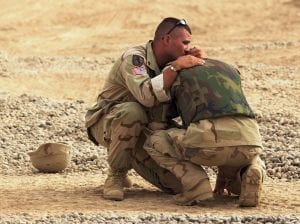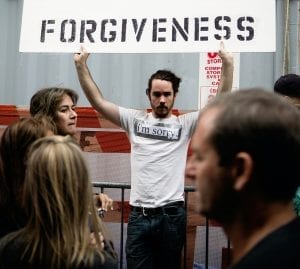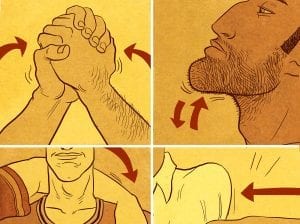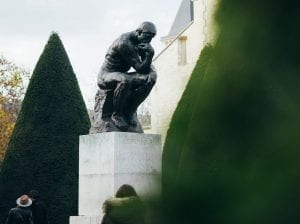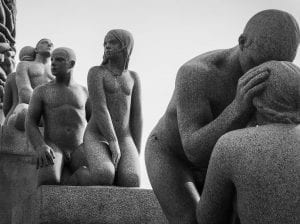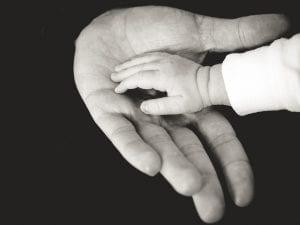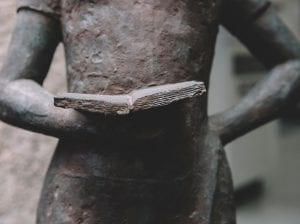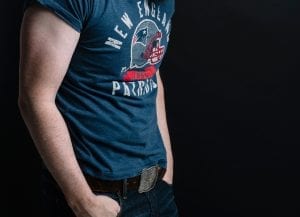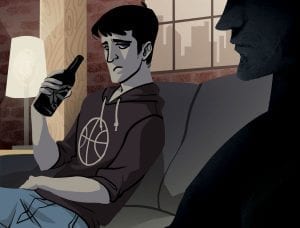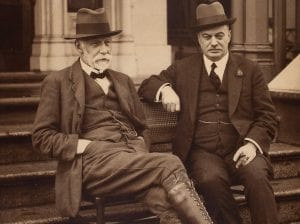The Patriots Made a Man of Me, in a Manner of Speaking
Through football, a gay guy finds belonging among straight guys and in the process allows both to become at peace with themselves.
That may sound strange—you may not judge debating the merits of the latest plasma television or sparring over the quickest highway directions as conversational standards to aspire to. But I’ve always longed for the camaraderie that succeeding at guy talk confers. Whenever I’ve tried to bridge this language divide, I’ve mostly crashed and burned. (Lobbying to read my college roommates’ Tarot cards rather than attend a frat party did not go over well.)
In attempting a male Esperanto, a hybrid between how straight men talk and how I talk—a Manglish if you will—I’ve only freaked guys out. And I had pretty much resigned myself to this communication impasse. Until three years ago, that is, when I made the fateful decision to begin watching the New England Patriots play football.
I hate to admit that it was because I liked the quarterback. More for his spirit than his face (even though his face could be on a Greek statue), but also for the team’s anachronistic humility. The Patriots just seemed like good guys, the kind we sought to become as young athletes. I had never really followed football, always finding it to be something I was happy to resist as another bad metaphor for the male condition. But I was starting to become involved with things I had never experienced, including a relationship with a woman, and my heart and mind were open.
I know what you’re thinking—a gay man with a straight woman? Wasn’t that a television show? And while I concede that certain episodes of Will & Grace have made us laugh in eerie recognition, my relationship with Lynn wasn’t founded on comic lightness or spit-takes but forged on an anvil of deep emotional connection I hadn’t been able to find with anyone else.
In short, we rescued each other. She was in a lonely marriage, and I was broke, unemployed, and just trying my best to get through each smog-filled Los Angeles day. A magazine editor, Lynn first lifted me out of my despair by giving me a series of writing assignments and then yanked me out of Los Angeles altogether by offering me a staff job in Boston. And that’s when we started hanging out together—kickboxing class, long lunches out—and where she opened up about her marriage and I got reacquainted with the solace of human contact.
One day as I listened to her, a distant thought rumbled locomotively to the fore of my brain. “Are you waiting for someone’s permission to leave your husband?”
Six months later, she and her husband decided to end their marriage, and she moved in with me.
I know, I know. You’re still saying: but a gay man and a straight woman? C’mon.
But emotionally we were already entwined, and it proved not difficult at all to stretch into the physical. When it finally happened I was shaking, but this was more because I had never experienced that kind of love—with a man or a woman.

I embarked on an intense weight-lifting routine, for example, and returned to the kind of swimming I once had done competitively. My body went from the poverty-induced proportions that had inspired a couple to solicit me as a hooker on Hollywood Boulevard (I thought they wanted directions) to a build that was more rugged, more imposing. Maybe I also incorporated some bad-guy-like behavior—open scratching, audible burping, a more earthy sensibility—but that was just icing. These transformations were more natural than they sound, which is why I didn’t wonder at all when I began tuning in Sunday afternoons. Watching football was an aberrant manifestation of my already aberrant condition.
That’s when a strange and unexpected thing happened. As a result of my more masculine disposition, men started liking me—straight men, I mean—and at last I was ushered into that foreign land of guydom whose borders had been long closed to me.
In my second N.F.L. season, I showed up at family gatherings and found myself contributing quiet gems of football statistics, rumors, and insider knowledge. I had signed up for the Patriots’s listserv by then and read all the hyperlinked articles, so I knew Tom Brady’s quarterback rating (and also that if a “big guy” like him could highlight his hair, so could my cousin). I knew the answer when somebody who assumed he was more alpha would frustratingly snap his fingers looking for the right player to prove his point. With these small displays, I suddenly found arms around my shoulders and myself in corners of rooms inside a familial huddle that included other men. I was becoming more fluent in their language, though they had yet to speak mine.
Fast forward to the beginning of my third N.F.L. season, this one. I was over at Lynn’s sister’s house, where I still hung out now and then. Her brother-in-law and I were scraping paint outside, shirtless but wearing lead-filtering biohazard masks and listening to heavy metal. Still, although I’d made strides in my acquisition of malespeak, he and I were not talking. I was enduring yet again that awkward man-with-man silence I so longed to break out of, when suddenly, from behind his mask, came a question. And not just any question. A football question: “You think the Patriots are ever going to solve their running game?”
I teetered on my ladder for a second. Did this guy—a construction worker and a rabid Pittsburgh Steelers fan, he of the numerous football magazine subscriptions and full N.F.L. cable package—really just ask me that?
“I think we did solve the running game,” I said, swaggering down the ladder for a drink of water. “We got Corey Dillon, and he’s going to be a thousand-yard rusher, trust me. And I hear Brady worked on his arm all summer. They’re not going to be the dink-and-dunk team they had to be last year. Plus, they’re the defending champs.”

The Metallica song faded out, and during the lull made by the idle guitar licks and silenced vocal rage, he said: “How’s your novel anyway? I always mean to ask; it’s just, with all this stuff I’ve been dealing with, well, you know.”
“It’s good. I mean, it’s coming.”
I had long finished the water in my mug, but I faked sips to stall for time and strategy as to what to say next. I had a feeling he was doing the same. We pointed our gazes in multiple directions: the ladybug on the boom box, one of their dogs in the shade, the tire swing that still held the rain from two days before.
“How about the baby?” I asked him. “How’s that going?”
He shook his head and inhaled deeply. They’d been trying for a while, and the struggle hung over the house like some Greek curse. “I don’t know. Do I really want to bring another life into this world?”
His question was less the luxuriant musing of an expectant parent than the sad weariness of a long-denied one.
I put down my mug and fixed on him. “Tell me why you want to be a father.”
And, much to my surprise, he did. He talked about the influence one individual can have on a human and how a parent’s role must be to ensure that influence begets a humanity. He mentioned the tough years he had experienced in school and explained what kind of education he envisioned for his son or daughter—a mind that was less trained than open and a spirit that overruled the cultural values he deplored today: ambition, selfishness, and indifference.
“You know,” he said, suddenly realizing he had been holding the floor for a while. “It’s really nice to talk like this.” Then he laughed. “It’s not standard fare at the construction site.”
I laughed back. He and I had traveled across our respective boundaries; we’d been both natives and tourists, and we’d found common ground at last.
These days, I have a passable Manglish—I seek out every opportunity to use it—but you can tell I still have an accent. This Christmas, when I received DVDs of the Patriots’s previous Super Bowl seasons from Lynn’s brother-in-law, I said I hoped there would be lots of interviews with the telegenic Mr. Brady. He just smiled.
Ah, well. With this Super Bowl, I like to think that between the nachos and flan, I’ll be able to offer a couple more guys a place to be both a native and a tourist. A place to speak the languages that are, in fact, innate to all men. Somewhere that’s the best of both worlds.

